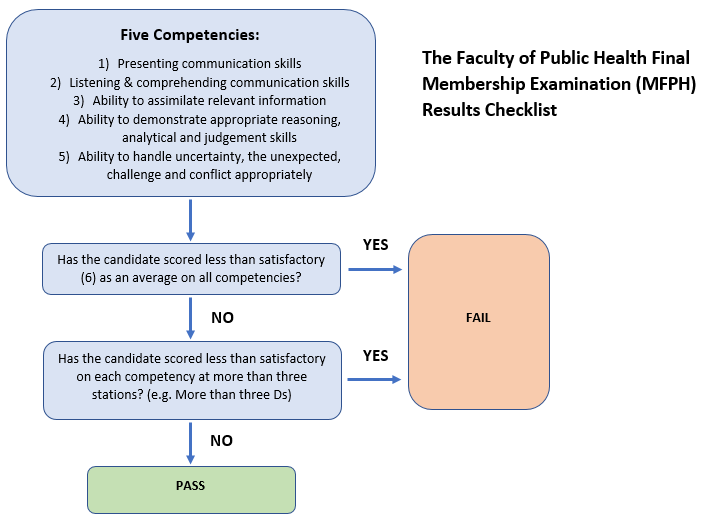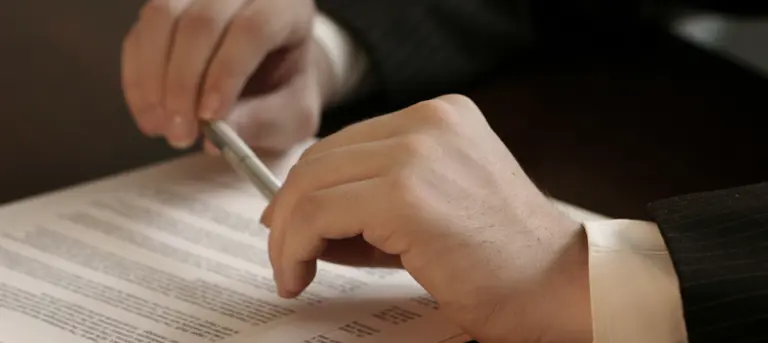Marking, results and feedback
Marking
Using marking guidance, the examiner grades each competency A-E, with A being excellent, B being good, C being adequate, D being just below adequate and E being poor. These grades are recorded on tablet devices and are later converted into numerical scores which are combined to produce an overall exam score and an average for each of the five competency areas.
A candidate awarded a C for each competency at all six stations would indicate a pass overall. However, the marks for each competency are averaged, so it is possible to do less well on, say, two stations, and yet still pass overall by getting marks higher than a C at other stations. The other requirement for a pass is that each competency area must be marked at C or above at half or more of the stations.
In collating final marks, a borderline adjustment process is also used to enable all stations to have equal weighting. This means for example that if a station’s raw scores were lower compared to other stations at the same sitting, then all the scores for that station would be multiplied by an adjustment factor. The higher of the raw and weighted score is used in the final mark. Please see the Final Membership Examination marking algorithm (image below) for a summary of how results are determined.
Weightings and marking thresholds for the Final Membership Examination are not published to examiners or candidates. See Publishing Weightings and Marking Thresholds for more information.
The overall marks are shared with the Chief Officer and after independent review by an external educationalist, ratified at the Examination Board.

Results and Feedback
From May 2024, candidates will only be able to access their FPH exam results through the new FPH Members Portal.
Please see the instructions below on how to do this.
Guidance For Candidates On How To Access FPH Examination Results
The Exam Coordinator will email candidates to notify them when the results have been released into the Members Portal.
Please note that although you will be able to see the overall outcome of your previous attempts, you will not be able to see results letters for sittings prior to May 2024.
Results will be released within ten working days of the examination. There are two possible outcomes of the examination: Pass or Fail. No part or question of the OSPHE can be banked. Candidates are also given feedback in the form of average scores for each competency.
If a candidate has passed the examination, their name is passed to the Membership Department of the Faculty. They will be asked to become a Member of the Faculty, which is one of the requirements for the award of a CCT and inclusion on the GMC’s Specialist Register or UKPHR’s Specialist Register. If the OSPHE is passed prior to or while on a break from the training scheme it will only be considered valid for CCT if the candidate enters/re-enters the training programme within the following seven years.
Results from recent sittings
|
Sitting |
Number of candidates |
Pass rate |
| February 2019 | 23 | 87% |
| April 2019 | 24 | 63% |
| June 2019 | 24 | 96% |
| September 2019 | 22 | 100% |
| December 2019 | 22 | 95% |
| February 2020 | 23 | 87% |
| November 2020 | 23 | 91% |
| December 2020 | 17 | 100% |
| February 2021 | 16 | 100% |
| April 2021 | 22 | 86% |
| June 2021 | 20 | 100% |
| September 2021 | 20 | 90% |
| December 2021 | 23 | 96% |
| February 2022 | 21 | 81% |
| April 2022 | 20 | 85% |
| September 2022 | 20 | 95% |
| November 2022 | 22 | 95% |
| February 2023 | 22 | 100% |
| June 2023 | 19 | 100% |
| September 2023 | 19 | 89% |
| November 2023 | 21 | 95% |
| February 2024 | 22 | 96% |
| May 2024 | 22 | 91% |
| September 2024 | 23 | 87% |
| November 2024 | 22 | 95% |
| February 2025 | 22 | 91% |
| April 2025 | 22 | 95% |
Resitting the exam
Candidates will not normally be permitted more than six attempts at the OSPHE without providing evidence of additional educational experience. If attempts are undertaken more than seven years after passing the diplomate exam, the candidate may additionally need to resit the diplomate exam.
Contacts
Final Membership Examination: Telephone number: 0203696 1484 / e-mail address: educ@fph.org.uk
Finance: Telephone number: 0203 696 1465 / e-mail address: finance@fph.org.uk








